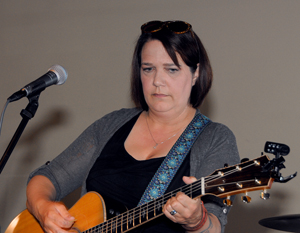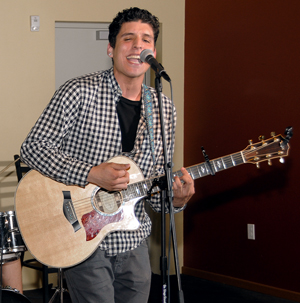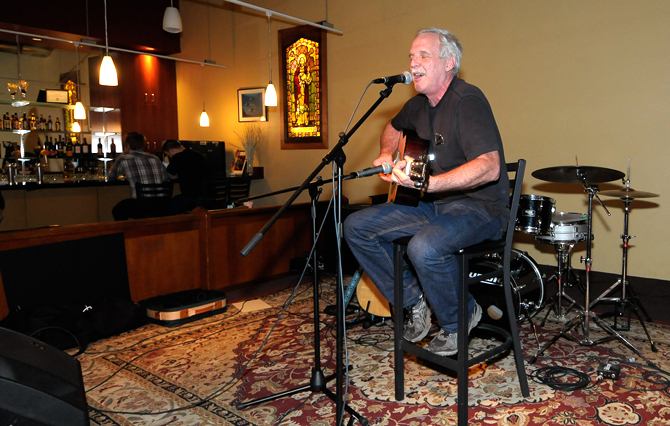At the intersection of two downtown streets in workaday Renton, Washington, across from the sandy-bricked Renton High School and around the corner from a Safeway superstore, there’s a venue that defies definition.
“We get asked every day, ‘What is this place?’” said Gretchen Mertes of Luther’s Table, a cafe-cum-bar-cum-nightclub-cum-community hub that just happens to be run by a Lutheran church.
At a recent open-mic night, an audience of 75 listened as eight performers took turns on the stage, strumming guitars and crooning to the crowd. It's among the most popular weekly events on a schedule that includes Theology Pub (“We’re taking this Bible study to the bar,” reads an event description) and Socrates Cafe, which smiles upon contemporary philosophizing.
Some performers show up to sing every week, belting out everything from Bruno Mars to Simon & Garfunkel. Others, like a trio of two men and a woman, were first-timers, harmonizing, “How did you love me, Jesus? I’ll never know why you loved me so.”
Jesus references tend to make Mertes cringe, although any kind of lyrics are fair game provided they're family-friendly. It’s not that Mertes, 40, is anti-Jesus -- far from it.

Even so, Mertes is careful to tread lightly when negotiating the establishment's very different roles of church and restaurant. She wants people to feel welcome, particularly those for whom church is a struggle. The kitchen, for example, is closed on Sundays when worship services are held. The scheduling is intentional.
“There's never a bait-and-switch, where people come in and we say, ‘Here's your beer … and here's your Bible,’” Mertes said. “By keeping those things separate, we avoid confusion. We only have church services when we are closed, closed, closed.”
It’s important to delineate the space between sacred and secular because Luther’s Table exists primarily to provide a place for those who feel alienated by conventional church services.
“It’s kind of weird to go to church when you don’t have a relationship with God,” said Mertes, a self-described foul-mouthed, tattooed mother of two. “This is a place for people who got burned by church. This is an in-between spot.”
One church closes, another steps in
How this place achieved that middle ground is the story of one church closing and another stepping in to expand its reach, albeit in an unconventional way. Luther’s Table occupies the former site of Renton Lutheran, a blue-collar church that had its heyday in the 1960s and 1970s.
By the time the Rev. Martha Myers took over in 1983, the congregation was losing membership. The neighborhood around the church was changing, urbanizing.
After her first year, Myers told the bishop, “I can’t save this congregation. What do you expect me to do? He said, “I expect you to preach the gospel and love the people.” And she responded, “That I can do.”
Myers continued preaching to a congregation hungry for Christian education. But funds dwindled. Renton Lutheran went into survival mode. They looked to the future -- and the past -- and assessed their core values.
Virtually from its inception, the church had always maintained several apartments to help house the area's booming population. The congregation decided that transitional housing would be a priority; they also yearned for what Myers called a “cutting-edge church piece,” although they didn't know what form it might take.
By 2006, Renton Lutheran, gently encouraged by the Northwest Washington Synod, had decided to close. This was not news to the neighboring Lutheran congregations that had helped strategize solutions over the years. One of them, St. Matthew’s Lutheran Church, was asked by the synod to take the lead in reinventing Renton Lutheran.
St. Matthew’s had a history of developing missions, and it worked with a team from the other churches and the synod to honor Renton Lutheran's legacy. They would demolish the building, which had fallen into disrepair. In a nod to the importance Renton Lutheran had placed on housing, they would work with a nonprofit and the Veterans Administration to establish veterans housing on the top floors of the new building. The bottom floor would support a new church model: a church that really wasn't a church at all.
Mertes, a member of the St. Matthew’s pastoral staff since 2006, was part of the committee that was brainstorming ideas for Renton Lutheran's redevelopment and proposed a bar, with food and music.
‘Conversations about things that actually matter’
“I've had more meaningful conversations about life and faith and things that actually matter in bars once people find out what I do than I’ve ever had in my church office,” Mertes said. “I thought, ‘What if we could create that ethos of freedom of conversation outside a church but in a place where pastors are still around?’”
It seemed to make sense.
“So many people think that God is only active within church walls, but God is everywhere,” Mertes said. “At a bar, people naturally relax. We had the idea that this place can be a middle ground. We can create a place where they can express their faith or lack thereof safely.”
The synod was supportive.
“We live in a time when we really need to experiment,” said the Rev. Jerry Buss, the synod’s director for evangelical mission. “We don't really know anymore what will lead to the impact we hope for. We need to try things that look more traditional and things that look more unusual.”
Luther's Table is certainly unusual, considering its juxtaposition of Jesus and juice, Bible and beer. Many churchgoers might think the association odd, even inappropriate, but to St. Matthew's, it feels just right.
Renton is on the outskirts of Seattle, birthplace of Jimi Hendrix and grunge band Nirvana, and one of the most unchurched areas in the country. For years, St. Matthew’s had dreamed of supporting a venue where bands could play, a laid-back, accepting sort of place where people could connect about things that matter and have the sorts of conversations that our frenetic, 24/7 world doesn’t often allow.
“Our goal is to have people engage,” said Mertes, whose arms are decorated with tattoos, including one of Moses and the burning bush, a reminder that “God is not always where you expect God to be.”
At Luther’s Table, God -- or Jesus, more precisely -- is right next to the bar. When Renton Lutheran was torn down, St. Matthew’s attempted to salvage as much as possible. That included glossy pews that now serve as restaurant benches, Renton Lutheran's cornerstone, and a stained-glass portrait of Jesus -- Renton Lutheran’s only stained-glass art -- that was installed to the right of the beer taps.
‘Where else would Jesus be?’
“Where else would Jesus be but at the intersection of sacred and secular?” Mertes said. “Jesus wanted to hang out with the tax collectors and sinners. He didn’t want to hang out with church people.”
Reformation leader Martin Luther acknowledged alcohol’s ability to encourage conversation and often invited students over for a pint of his wife’s ale and some theological repartee around the table -- hence the restaurant’s name, Luther’s Table.
“We lead from Martin Luther’s example and invite people to gather around the table with beer or coffee,” said Jon Glenn, who runs marketing and fundraising for the cafe. “We are using beer and food and coffee to create community, to stir up conversations. Beer and food and coffee are social lubricants. If we can gather people around the table, we can create an opportunity for conversation that can change the community.”

“I don’t think God necessarily works the best through horrible praise music,” Mertes said. “It’s a lot more effective to get up and sing Alanis Morissette sometimes.”
For Gonzalez, the music was a motivator.
“This was a lot more relatable for me than other churches I’d been to, because I connected through the music,” he said. “The group was smaller, more intimate, and people shared their stories.”
In the three years it’s been open, Luther’s Table has left its mark on Renton. With its downtown location, it’s a convenient place for business and community leaders to hold meetings; recently, the mayor and police chief lunched there. But it’s also a place where people who aren't power brokers are welcome; during the first two hours after Luther’s Table opens for business, homeless people can drop by for a free cup of coffee.
Charitable charity, precarious finances
It’s also a charity that’s charitable, helping keep other nonprofits afloat. As a no-tipping establishment, Luther’s Table accepts donations. Each month, Mertes cuts a check for a third of the collections and presents it to an unsuspecting nonprofit.
That generosity belies the precarious financial situation in which Luther’s Table has found itself since day one. The cafe costs about $30,000 a month to operate but typically brings in only about $20,000. They cover the shortfall with grants from the ELCA and donations from Luther’s Table customers, the Sunday collection plate, and people in the community. The board is in the process of revamping the concept, perhaps downsizing from a full-service restaurant to an easier-to-sustain coffee shop that serves wine and beer.
“If we were any other restaurant, we would have closed three months in,” Glenn said. “But the cool thing about Luther’s Table is that people believe in the mission, that having a place to gather for conversation is critical to having Renton become a better place to live and be.”
There have been other challenges and stumbles as well. Some, like the establishment's growing popularity among church people, have proved tricky to navigate.
“In a lot of ways, Luther’s Table has swung to a place where church people hang out,” Glenn said. “We have gotten away from our mission to be a place for conversation and community for people outside the church. A lot of our recent dialogue is how to come back to that mission to be a place for people damaged by the church.”
Among the plans: implementing more dynamic programming such as a lecture series, film nights and trivia nights.
Reclaiming its raison d'être is an ongoing process of discovery for Luther's Table.
“The more we can continue to have it be a place that is for people outside the church, that will be our best measurement of success,” Buss said.
It's hard to strike the perfect balance, acknowledged Mertes.
‘It doesn't make sense to anybody’
“The challenging thing about this place is that it doesn’t make sense to anybody,” she said. “It doesn’t make sense to church people. It doesn’t make sense to non-church people. There is the tension of standing with one foot in the church and one foot in the world and just staying there and saying, ‘We're good in both places.’”
The issue of alcohol has been another obstacle. About nine St. Matthew's families who disapproved of the restaurant’s mix of alcohol and theology left the church when the vision for Luther's Table became clear.
Indeed, when Bishop B. Kirby Unti asked Mertes to present the concept of Luther's Table to the Synod Assembly, a gathering of 400 or so church leaders, she worried about the reaction.
“A church setting a stumbling block in front of an alcoholic is more than some people can handle,” she said.
But her PowerPoint presentation received a standing ovation. To show its commitment to encouraging moderation, Luther’s Table now hosts a weekly Alcoholics Anonymous meeting.
The emphasis on hospitality extends to a group of students with developmental disabilities who come to Luther’s Table to learn basic restaurant skills such as how to bus tables, wash dishes and roll silverware. Many other establishments declined to offer the students a similar opportunity, Mertes said.
“We are one of two restaurants downtown that let these kids come volunteer. They are a gift to us.”
Martha Myers, Renton Lutheran's last pastor, is another volunteer. She has donated her time since Luther’s Table opened its doors (the restaurant’s front façade consists of garage doors that are rolled up in good weather to make the place feel wide-open and welcoming).
Shuttering a congregation is never cause for celebration, but when Renton Lutheran closed its doors the day before her 60th birthday, Myers said she was at peace knowing Luther’s Table was in the works.
“I was happy, because we made something happen,” Myers said. Although she is still sometimes baffled by the essence of Luther’s Table, she is particularly pleased with the veterans housing component.
“Just the fact that we took over 100 people off the street is so satisfying,” she said. “This is not a ministry I could ever have imagined. It is a mystery to me -- I never hung out in bars -- but I think it’s great. I don't know that anyone thinks we did the wrong thing.”
Questions to consider
Questions to consider:
- What are your church’s core values? In what new ways and new forms might they be expressed?
- Where do you have conversations about “things that actually matter?” Do they happen at your church? If not, why?
- How specifically does your church make your city or town a better place to live and be?
- How can your church “not make sense” and defy people’s expectations about church?
- What is your church’s reason for being? What can the church do to keep it in focus?







